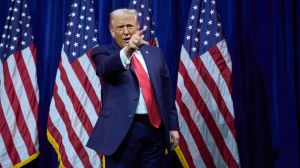Skirting the key issue
Newspaper reports tell of a briefing by a senior official of the Prime Minister's Office no prizes for guessing who at which it was sta...

Newspaper reports tell of a briefing by a senior official of the Prime Minister8217;s Office no prizes for guessing who at which it was stated that the government is convinced that, bar the Left, all other political parties are prepared for India to sign the Comprehensive Test Ban Treaty CTBT by September 1999.
September 1999 is nine months and, possibly, one government away. In any case, it is no kind of deadline. For nothing is going to happen on or soon after that date except that the signatories will get together to see whether there is not only the required numbers for bringing the treaty into force but also whether those numbers include those without whose signatures the treaty remains a scrap of paper. Those signatures include that of India. Assuming that the required quantity and quality of signatories is not available, those present will then decide what to do.
Whatever they decide to do or not do, they will have to bear two factors in mind. First, that neither the CTBT nor any other element ofinternational law can extinguish national sovereignty. So long as we are not a rogue state, and perhaps even then, legal recourses would be available at The Hague and in UN forums for any state, ours included, to assert its sovereign right to determine what international treaties to accede to and which not.
Second, the concluding statement by the chairman of the Ad Hoc Committee of the Conference on Disarmament at Geneva, which prepared the CTBT, explicitly ruled out pressure or sanctions on any sovereign nation to compel it to accede to the CTBT against its sovereign will. While therefore, the review conference following the September 1999 target date might decide, in the light of these two factors, what it will do to us if we are not by then signatories to the CTBT, it is not as if we will be up the spout by that date if we do not. The day of final reckoning is, therefore, not nine months but many moons away. That being so, it hardly behoves the spokesman of the present wobbly government to assert whatany party, other than the one he speaks for, will or will not do at some distant point in time.
Why did we not sign the treaty? Was it only, or even primarily, because we needed to test our nuclear weapons before signing up? If that were the case, then surely we should have signed up immediately after May 13 and then talked incidentals with the US as a CTBT signatory? Indeed, if that were all we had in mind, we could have gone in for Pokharan II when France and China undertook serial tests on the eve of signing up. It is clear from the ease with which the mint-fresh BJP-led government lit the fuel in May 1998 that we had long before readied ourselves to enter the nuclear weapons club. All the BJP did was perform the graha pravesh.
Indeed, if preserving the right to test had been the main motivation, the time to have tested was in 1993 before co-sponsoring with the US the UN General Assembly resolution which paved the way to the Geneva negotiations. Governmental leaks and bald official assertions indicatethat the test option was under the active consideration of the Rao government. It was an option not exercised. This only reinforces the argument that, at the time at any rate, it was not primarily to keep our option of testing open but other considerations which persuaded us to keep open the option of not signing the CTBT if it did not suit us to do so.
Now that we have tested, we are being urged to sign up. It is certainly an opportunity to secure something in return. The present government has sought the lifting of US economic sanctions and access to dual use technology as the bargain for acceding to the CTBT. These dual sanctions, economic and technological, let it be noted, have not been imposed on India and Pakistan under international law but under the domestic law of the US. Moreover, US domestic law now permits the executive to lift these sanctions whenever it chooses to so. The continuance of US sanctions is now, therefore, a matter not of US law but of US policy.
There is no give from the USside on dual technology. The Indo-US agreements on hi-tech entered into in 1985 have been rendered null and void unless we foreswear nuclear weapons. As for economic sanctions, the US has made it abundantly clear that the only condition under which these will be eased or raised is if sanctions begin to bite, as they have with Pakistan. For the rest, so long as the impact of economic sanctions is symbolic, they will be imposed as a symbol of the US determination to limit nuclear weapons hegemony to the existing N-5. As the N-5 are also the P-5, the bottomline is that the existing world order must, in essentials, be left unchallenged.
The Jaswant-Talbott talks are leading nowhere, and will lead nowhere, because they make the Indian signature on the CTBT dependent on the consequences of testing, not on the removal of the flaws in the CTBT which were the primary cause of our refusing to sign.
Throughout the negotiations, as the record bears out and as Ambassador Arundhati Ghose has time and again asserted,India based its refusal to sign first and foremost on the insistence that the CTBT be linked integrally to a time-bound plan for the elimination of nuclear weapons in identifiable and verifiable phases. Only the 1988 plan prepared by the Rajiv Gandhi government signposts the way to such a goal. And because it bears his name, the present government refuses to reassert it. Nor do they have an alternative plan. So, ritualistic noises about disarmament no-twithstanding, the Jaswant-Talbott talks have skirted the central issue raised by India at Geneva 8212; which is the integral linkage between specific, discrete measures of nuclear restraint and the global security objective of time-bound elimination.
It is essential that in his new incarnation as external affairs minister, Jaswant Singh take a holistic approach to his conversations with Strobe Talbott, which place on the table India8217;s larger foreign policy goals. These have been evolved over the past half century through national consensus. He should then makeclear to the US that we cannot contribute to their foreign policy priorities unless they take ours into account. This must include the commencement of negotiations in Geneva aimed at the time-bound, if phased, elimination of nuclear weapons. Only then will Jaswant Singh 8212; or his successor in an alternative government 8212; even begin to secure a bargain acceptable to the country as a whole.
- 01
- 02
- 03
- 04
- 05































